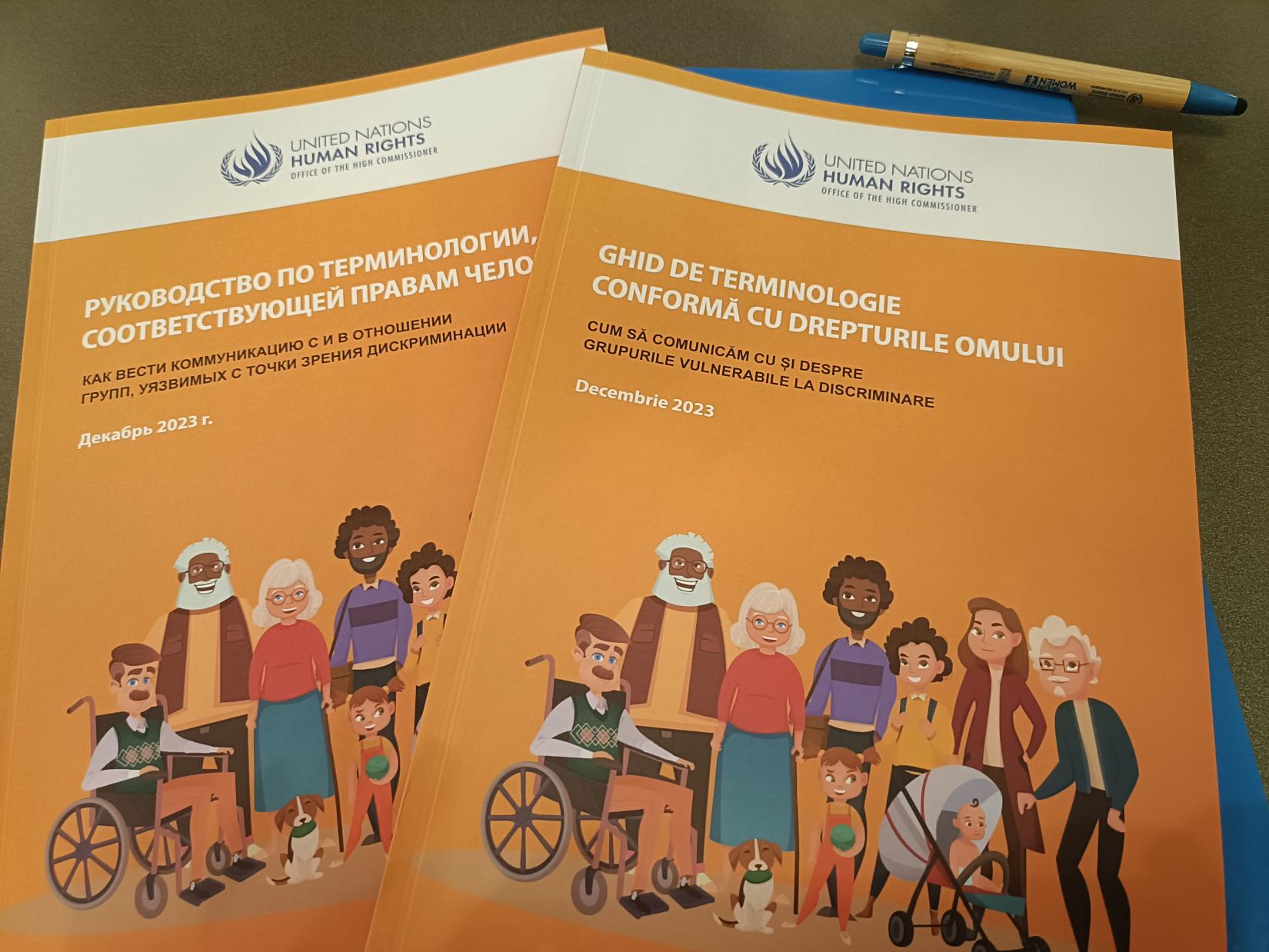Words as tools for change: UN Human Rights initiative empowers communicators to uphold human rights through inclusive language
09 august 2024
- In an era where public communication wields immense power to shape societal norms and influence attitudes, the ethical use of language is crucial to upholding fundamental human rights.

UN Human Rights Moldova (OHCHR) considers language a powerful instrument for promoting equality and non-discrimination and fostering a culture of respect and acceptance. OHCHR is dedicated to empowering individuals and institutions to use human rights compliant terminology and language as a catalyst for positive social change.
This commitment is evident in OHCHR's recent initiatives in Moldova, aimed at equipping communication specialists with the knowledge and skills to communicate in a way that safeguards the dignity and human rights of all. In July, a comprehensive training program enhanced the knowledge and skills of communication specialists from diverse state institutions related to human right compliant communication with and about groups vulnerable to discrimination. The program was based on the Terminology Guide for Human Rights-Compliant Communication developed by OHCHR Moldova and released in June 2024.
Facilitated by the OHCHR team and partners such as GenderDoc-M Information Center, HelpAge International Moldova, the Medico-Social Rehabilitation Center "LOW VISION" and the Equality Council - the training delved into key topics focusing on promoting inclusive and human rights-compliant communication. Sessions included discussions and practical exercises on combatting stereotypes and prejudices through gender-inclusive communication, inclusive communication with and about LGBTQI+ people, as well as persons with disabilities and minorities.
“The use of Human Rights-Compliant Communication in media and communication products is crucial in ensuring that groups vulnerable to discrimination are represented accurately and respectfully,” emphasized Tatiana Cernomoriț, Human Rights Officer, OHCHR. “By adopting human rights compliant language, we contribute to a more inclusive and equal society.”
The training was well-received by participants, who emphasized its practical value for their work. Nina Balica, Head of the Registration and Archiving Department at the National Council for Disability Determination and Work Capacity Assessment, noted the relevance of the topics covered for her institution's communication with persons with disabilities.
“The guide and the knowledge gained here are a valuable resource that will help us communicate correctly and effectively, taking into account human rights-compliant terminology,” she stated.
The participants have also increased their skills on developing accessible content for persons with different types of disabilities. For this, the representatives of Center "LOW VISION" provided the participants the opportunity of experiencing the lack of accessibility of communication products for persons with visual impairments, but also what visual accessible content is.
The training also addressed communication about persons living with HIV, persons who use drugs, and those under any forms of detention or imprisonment, emphasizing the importance of human rights-compliant messaging in these contexts.
Aliona Grădinaru, a representative of the mass media and communication service of the National Administration of Penitentiaries, stated: "We learned a lot of good information regarding communication with and about persons with disabilities and ethnic minorities, which is very important for our institution, as we have both persons disabilities and representatives of different ethnic minorities in penitentiary institutions. Now we are more informed about how to address and communicate with these persons so as not to involuntarily marginalize them. The workshop was essential and we welcome it, as we have not had such training before, but we communicate very often, including about and with people from groups vulnerable to discrimination. Until now we had to research ourselves from multiple and different sources regarding the correct terminology to use but now it is all in one guide and clearly explained to us."
Additionally, participants were instructed on the use of inclusive terminology when discussing about older persons, thereby upholding their human rights and dignity. They analyzed various examples of media products illustrating cases of pejorative language in reference to older persons and discussed recommendations on how to avoid reinforcing incorrect perceptions, and generalizations.
Dan Verejanu from the Ministry of Justice's Information and Mass Media Communication Service found the workshop informative, stating, "By participating in this workshop, I learned more about the recommended terminology in communication about and with persons with disabilities, older persons, and people from different minority groups. I will use the recommendations in developing communication products for the mass media and information materials for citizens."
Each participant received hard copies of the guide, available online in Russian, Romanian, and English versions to share with their colleagues and use in their further public communication.
Violina Crăciun, Head of the Communication and International Relations Department at the Republican Center for Children and Youth "ARTICO" highlighted the guide's significance for her work as a communicator. "This guide and training are very welcome in my work, especially regarding the correct terminology to use when referring to various groups vulnerable to discrimination," she said. "We promote social inclusion, and our services are open to all children and young people. Some groups of people referred to in the guide are our direct beneficiaries, and we will use the recommended terminology in our communication products. This guide is also beneficial for the Center's specialists who organize activities with children and young people, so we will promote it among them."
OHCHR commends the dedication of all participants and hopes that this initiative will inspire individuals across sectors to apply human rights-compliant communication practices in their professional endeavors. The training is part of a series of awareness-raising events among professionals in media, public relations, and communication on the use of human rights-compliant communication when referring to the groups most vulnerable to discrimination, prejudice, and hate speech.


